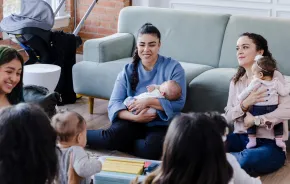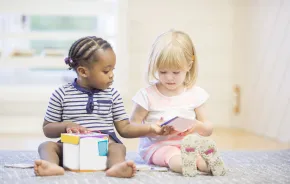
Editor's note: This article was sponsored by the Washington State Department of Health.
When the COVID-19 vaccine got the green light to be administered to the youngest age group this past June, pediatrician Amy Carter, M.D., recalled children coming to vaccine drive-through clinics dressed up in special outfits. Some families decorated their cars with balloons, and she remembers one small child in particular who yelled out the window, “Give me the shot!”
“No 3-year-old does that for any other shot,” says Carter, who is chief medical officer of Allegro Pediatrics. “Really, what they’re saying is, ‘Now I get to go to preschool!’”
For many Washington state families, the U.S. Food and Drug Administration’s long-anticipated authorization of Moderna and Pfizer-BioNTech COVID-19 vaccinations for kids ages 6 months–4 years inspired a huge sigh of relief. Families could begin to plan more social engagement activities, knowing that their youngest family members would be protected from severe illness or the risk of death due to a COVID-19 infection.
Even though many kids among this youngest vaccination candidate group may have already experienced a coronavirus infection, the vaccine is still the best defense against reinfection, Carter notes. Immunity from an earlier omicron infection wanes, and there is some evidence that omicron subvariants may be more efficient at infecting — and re-infecting — children. What’s potentially more concerning is that the health impacts of repeated infections are still not fully understood. Each time a child experiences a COVID-19 infection, there is a risk for developing multisystem inflammatory syndrome, a rare but serious condition associated with the disease.
Plus, the vaccine reduces the risk of experiencing long COVID, studies have found. It’s still unclear how many children are impacted by the virus beyond the initial illness. A recent report in the journal Nature found that up to 25 percent of children may experience long COVID symptoms, such as mood swings and fatigue, while another report published in JAMA Network Open has suggested that figure is closer to 5–10 percent. With so much still unknown, the safest choice is to provide your child with as much protection as possible, Carter advises.
“I am much more scared of the side effects, both short and long term, of the infection than I am of the vaccine,” she says.
Lesser dose, fewer side effects
Both the three-dose Pfizer-BioNTech and two-dose Moderna COVID-19 vaccines are now authorized for children ages 6 months and older. Parents are encouraged by the American Academy of Pediatrics to vaccinate their children with either.
The Pfitzer-BioNTech vaccine uses a 3-microgram dose, or one-tenth the adult dosage for that vaccine. The first and second doses are generally administered between three and eight weeks apart, with the third coming at least eight weeks following the second. Moderna’s two 25-microgram doses are administered four–eight weeks apart. It’s difficult to pinpoint the exact protection from evolving variants and subvariants, but health officials say both vaccines are highly protective against severe illness and death.
The vaccines have gone through the most extensive safety monitoring in U.S. history, according to the Centers for Disease Control and Prevention (CDC). Most of the side effects are mild, the most common being soreness and redness at the injection site. Very few children experience a high fever that lasts longer than a day or two.
In her own experience, Carter has also witnessed very mild effects, something she attributes to the lower dosage as compared to the adult dosage.
“These children are doing fantastic,” she says.
Underestimating risk
When Carter looks at the young patients sent by her pediatric practice to Seattle Children’s Hospital for treatment of severe COVID-19 infections, they’re not always the ones people might suspect. Some are immunocompromised or have had an organ transplant, but others have had only mild asthma or were overweight. Still others had no apparent risk factors.
Anecdotally, Carter has been struck by the number of pediatric patients with COVID-19 who describe symptoms of fatigue and trouble remembering things. While these symptoms could be attributed to myriad factors — including the toll of living through the pandemic itself — she wonders about the cumulative effects of contracting multiple bouts of the virus.
She encourages all caregivers of her pediatric patients to get the COVID-19 vaccine for their child. Yet, surprisingly, enthusiasm for the vaccine authorization for this age group seems to have waned, compared to the early days of the vaccine rollout when parents eagerly raced to get the first available appointment they could for their child.
“People were so excited that they were crying,” Carter recalls.
Now, there seems to be more hesitancy, more nervousness, and more questions. As of late July, just 800,000 children ages 6 months–4 years had received at least one vaccine dose, or nearly 5 percent of that population. That’s compared to 37 percent of the 5–11 age group who have completed at least one dose, and 30 percent who have completed the two-dose series, according to CDC data.
The lower figures might be a side effect of pandemic fatigue, Carter surmises.
“It has changed and evolved from this logical, scientific conversation to this very emotional gut reaction that people are having,” she explains. “I completely acknowledge that as humans, we’re all so sick of the pandemic.”
At the same time, she urges people to consider the facts. Nationwide, nearly 500 children ages 0–4 have died of COVID-19. That’s a dramatically higher figure than the death counts for other childhood illnesses, such as chickenpox, hepatitis A and meningitis, yet parents rarely have concerns about their children receiving those immunizations, Carter notes.
“Those numbers aren’t even close,” she says. “Yet parents will say they’re more scared of meningitis than COVID-19.”
All childhood immunizations are important and prevent complications, disability, hospitalization and potential death from disease, Carter adds. The COVID-19 vaccine should be seen as another mechanism to prevent negative outcomes from a serious illness.
The hesitancy surrounding the COVID-19 vaccine could be a result of living in a time with mass information and plentiful misinformation. Amid the deluge of information, individual anecdotes about a child having a reaction to the vaccine can earn undeserved sway.
That small fear outweighs the fact that 14 million kids in the United States have tested positive for the disease, thousands have been hospitalized and hundreds have died, Carter says.
Don’t go it alone
Many exhausted parents might not want to evaluate these figures and weigh their child’s personal risk. Instead, it feels safer to rely on personal stories of friends and family members who have had COVID-19 and recovered. Taking action — even doing something that could benefit your child — may seem riskier than choosing to do nothing.
That’s why Carter recommends having a conversation with a trusted health-care provider. These conversations can help a family understand the risk to its own members and the factors that might make its choices different than those of a neighbor or friend. Your family’s doctor might share information about antiviral pills, such as the fact that they have more side effects than the vaccine and aren’t yet approved for use in younger children. Pediatricians can discuss your family’s history with COVID-19 and whether your immunity has waned. These conversations can help a parent wade through the information to make the best decision for their family.
“Come in, tell us what you’re thinking — we won’t get angry — and we’ll discuss the options,” says Carter.
|
Sponsored by |
|
|












